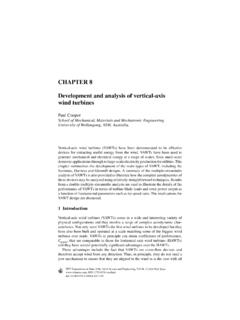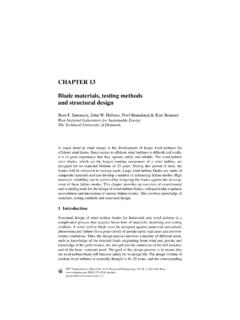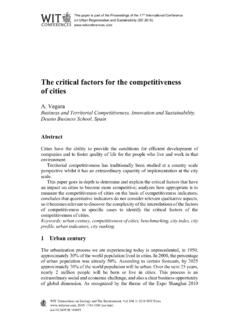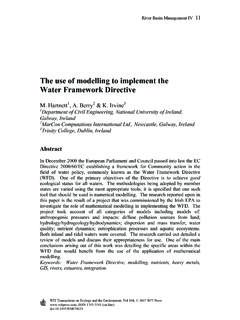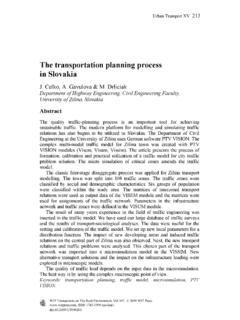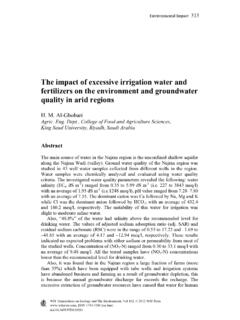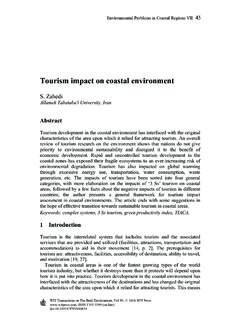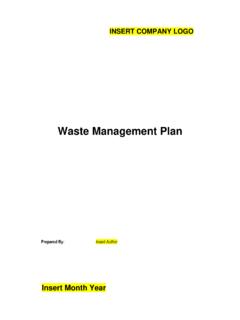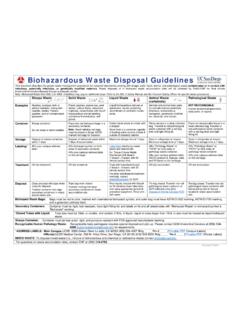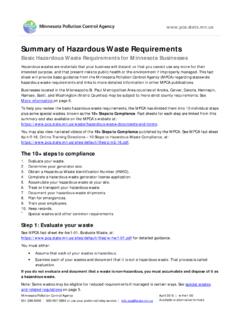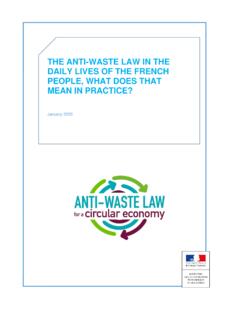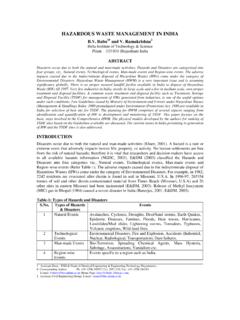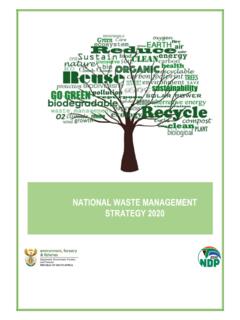Transcription of Environmental impacts of improper solid waste …
1 Environmental impacts of improper solid waste management in developing countries: a case study of Rawalpindi City N. Ejaz, N. Akhtar, H. Nisar & U. Ali Naeem University of Engineering & Technology, Taxila, Pakistan Abstract solid waste damps are seriously spoiling the Environmental conditions in developing countries. Negative Environmental impacts from improper solid waste dumping can be easily observed everywhere in the developing world. In Pakistan, due to a lack of proper planning and funding, the solid waste management scenario is becoming worse day by day. To highlight the main causes of improper solid waste management in developing countries, Rawalpindi city is selected as a case study. This city is facing miserable solid waste management crises due to rapid industrialization, urbanization and insufficient funding.
2 improper solid waste dumps are spreading different diseases in the study area. It is investigated during the research that due to rapid growth in population, increments in solid waste generation rate, management deficiencies, lack of legislative implementation and funding, the solid waste management systems of Rawalpindi are not working effectively. The major causes for the inefficient municipal solid waste management systems in Rawalpindi are the unintended invasion of the city, severe weather conditions, lack of social awareness/community involvement, improper resources including improper equipment and lack of funds. An inefficient municipal solid waste management system may create serious negative Environmental impacts like infectious diseases, land and water pollution, obstruction of drains and loss of biodiversity.
3 Keywords: solid waste management, Rawalpindi City, Environmental impacts , land pollution. The Sustainable World 379 , ISSN 1743-3541 (on-line) WIT Transactions on Ecology and the Environment, Vol 142, 2010 WIT 1 solid waste management scenario in developing countries solid waste management systems cover all actions that seek to reduce the negative impacts on health, environment and economy. Developing countries are seriously facing the associated problems in collection , transportation and disposal of communal solid waste . In Pakistan, due to unplanned communities and developments in major cities, Environmental and sanitary conditions are becoming very complex [1]. Due to a lack of awareness and low income sources, dwellers are forced to live with unhealthy and unhygienic conditions.
4 An improper solid waste management system may contribute to a worsening Environmental degradation of the community. Illegal dumping of communal solid waste is responsible for a number of diseases in Pakistan. Per capita, solid waste generation in developing countries is increasing annually due to an urbanization trend. Prototype and density of metropolitan areas, the physical composition of waste , density of waste , temperature and precipitation, scavenger s activity for recyclable separation, treatment capacity, insufficiency and limited resources are making tasks very tough for the administration authority in developing countries. Due to diverse life styles in communities, development authorities are not able to offer analogous type of solid waste management system for different communities, therefore in Pakistan a lot of abnormal solid waste management systems are working.
5 collection efficiency of the existing solid waste systems in Pakistan is very low due to a lack of storage bins and improper management system. Open dumping, open burning and un-engineered sanitary landfills are common practice throughout the country. Due to improper solid waste disposal and collection systems dwellers are facing serious negative Environmental impacts in developing countries [1]. In Pakistan, according to the Ministry of the Environment, about 54,850 tons of solid waste is being generated on daily basis in urban areas, less than 60 percent of this generated solid waste is being collected properly. According to the same department there is no city in Pakistan having proper waste collection and disposal system for municipal and hazardous wastes.
6 2 solid waste management issues in Rawalpindi City Many negative impacts due to improper solid waste management can be seen in Rawalpindi city. Insufficient funding and lack of solid waste management planning can be observed in the following figure 1. It can be observed from figure 1(a) that the collected solid waste is being transported in an open body tractor trolley and in figure 1(b) it is worth mentioning that in some areas of Rawalpindi city, collected solid waste is being dumped on the ground which is totally unhygienic. Masonry bins in the Rawalpindi city are also of great concern for the solid waste management authorities. 380 The Sustainable World , ISSN 1743-3541 (on-line) WIT Transactions on Ecology and the Environment, Vol 142, 2010 WIT Press (a) (b) Figure 1: Transportation of collected waste through open body trucks.
7 Associated negative Environmental impacts due to improper solid waste management in Rawalpindi City During investigation it was concluded that improper solid waste management systems in Rawalpindi City are resulting following negative impacts on the environment: Dispersed solid waste from the illegal open dumps often blocks the drains and sewers as shown in figure 2. Ultimately these blockages are creating flooding and unhygienic conditions in the city. Figure 2: Blocked drains due to solid waste dumps. Flies breeding are directly linked with open solid waste dumps. During the filed investigation it was observed that during summer the flies are increasing their population so rapidly due to these waste dumps and they are very effectual vectors that spread disease in the community.
8 The Sustainable World 381 , ISSN 1743-3541 (on-line) WIT Transactions on Ecology and the Environment, Vol 142, 2010 WIT Press Associated to the above problems, blocked drains and wastewater flooding in the city due to blocked drains are greatly supporting the mosquitoes breed and they are spreading the malaria and dengue in the Rawalpindi City. Proportion of food waste in open dumps and waste drains are providing an attractive shelter for rats. It was also reported that these rats are spreading disease, damaging electrical cables and other materials in the study area. The open burning of collected solid waste causing air pollution issues in Rawalpindi city. Uncollected solid wastes from few locations in the city are degrading the urban environment and discouraging efforts to keep streets and open spaces clean.
9 Discarded polythene bags in collected solid waste from Rawalpindi city are generating an aesthetic nuisance and they may also cause the death of grazing animals which eat them [2]. Due to a lack of health and safety facilities to the waste collection crew in Rawalpindi city, they are specifically facing occupational hazards, including strains from lifting, injuries from sharp objects and traffic accidents. Open dumps on the roadside and heavily sized solid waste storage containers are also creating traffic blockage in the study area. The city government is not providing separate waste collection facilities. As a result, a lot of dangerous items (such as broken glass, razor blades, hypodermic needles and other healthcare wastes, aerosol cans and potentially explosive containers and chemicals from industries) may cause risks of injury or poisoning, particularly to scavengers and school going children [3].
10 Open body trucks are being used for the collection of solid wastes in Rawalpindi city without covers. This practice is totally unhygienic. Heavy solid waste collection vehicles are causing significant damage to the road. Different segregated solid waste materials, such as plastic bottles and medical supplies, are not being properly cleaned or sterilized by local scavengers. During rainy seasons, produced leachate from the open dumped sites is causing serious pollution to water bodies in Rawalpindi city. A high percentage of collected solid waste from Rawalpindi city is being treated or disposed of in unsatisfactory ways, causing a severe aesthetic nuisance in terms of smell and manifestation. Liquids and fumes, escaping from deposits of chemical wastes are creating fatal or other serious effects to the community [4].
